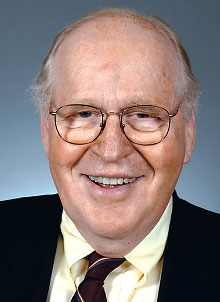Alan Stone, M.D., Past APA President, Dies
Abstract
Stone was one of the most important figures in establishing the study of psychiatry and law as a field of academic inquiry. He was also a prominent voice for psychiatric ethics on the international stage.

Alan Stone, M.D., a past president of APA, died January 23. He was 92 years old.
Stone was president of APA for the 1979-1980 term and a pioneer in the academic study of psychiatry and the law. He was the Touroff-Glueck Professor of Law and Psychiatry in the Faculty of Law and the Faculty of Medicine at Harvard University. He received APA’s Manfred Guttmacher Award for his 1975 book Mental Health and Law: A System in Transition and was chair of the Committee on Law of the Group for the Advancement of Psychiatry and chair of what was originally called the APA Commission on Judicial Action.
Stone was also a prominent voice for psychiatric ethics on the international stage. In 1978 he consulted with authorities in Poland about commitment laws. In 1979 he accompanied an APA delegation to South Africa to investigate apartheid abuses. He also visited the Soviet Union and interviewed Pytor Grigorenko, who was a high-ranking Soviet military general and hero of World War II and had been committed to psychiatric hospitalization by Soviet psychiatrists in the wake of Grigorenko’s criticism of human-rights abuses in the Soviet Union (Psychiatric News).
In 2005, he wrote an editorial in The New York Times about participation of mental health professionals in torture of detainees in the war on terror.
He remained active in APA throughout his life. In 2016, he was instrumental in bringing U.S. Supreme Court Justice Stephen Breyer to the APA Annual Meeting as a speaker (Psychiatric News). He co-wrote an article in the American Journal of Psychiatry in 2012 with past APA President Paul Appelbaum, M.D., titled “Protecting Psychiatrist’s Reputations on the Internet”, and in 2014 with past APA President Jeffrey Geller, M.D., M.P.H., on violence in the Journal of Psychiatric Services.
Stone is best known for his contributions to studying the intersection between psychiatry and the law. “Alan was one of the most important figures in establishing the study of psychiatry and law as a field of academic inquiry,” said Appelbaum.
“His 1975 monograph, Mental Health and Law: A System in Transition, opened up an era of active empirical and theoretical investigation focused on the interaction of the two fields. One of the rare psychiatrists to have held a tenured professorship at a major law school as well as a medical school, he trained many of the most important players in mental health law, both attorneys and psychiatrists. As a member of the APA Board of Trustees and president, he was instrumental in establishing the Commission—now Committee—on Judicial Action, which guides APA’s involvement as amicus curiae in major court cases. During his presidency, he initiated the forerunner of the Council on Psychiatry and Law, which he subsequently chaired. He remained actively involved with both the council and the committee almost until the end.”
Appelbaum added, “Personally, Alan was a pivotal figure in my own career. I met him at the end of my first week in medical school, taking his course on mental health and law, which inspired me to pursue psychiatry and law as my academic focus. He also provided critical advice on the development of my early career. My life would have been very different without his model and guidance. His death is an enormous loss for psychiatry.”
Stone was born in Boston and received his M.D. from Yale School of Medicine. He interned at the Grace New Haven Hospital, completed his residency at McLean Hospital, and spent a year in child psychiatry at the Putnam Children’s Center in Boston. He completed his psychoanalytic training at the Boston Psychoanalytic Institute and served as director of residency training at McLean Hospital. ■



